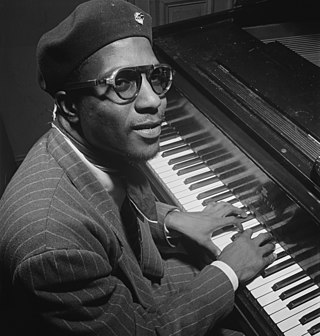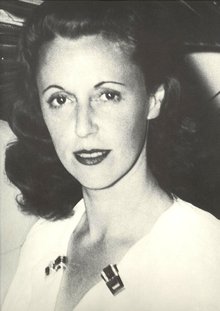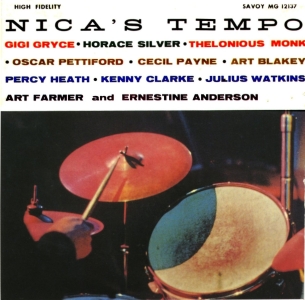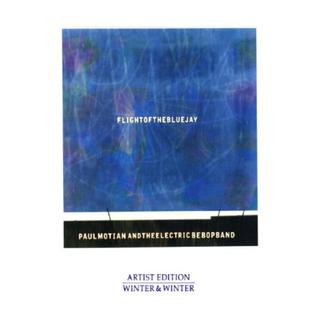
Bebop or bop is a style of jazz developed in the early-to-mid-1940s in the United States. The style features compositions characterized by a fast tempo, complex chord progressions with rapid chord changes and numerous changes of key, instrumental virtuosity, and improvisation based on a combination of harmonic structure, the use of scales and occasional references to the melody.

Thelonious Sphere Monk was an American jazz pianist and composer. He had a unique improvisational style and made numerous contributions to the standard jazz repertoire, including "'Round Midnight", "Blue Monk", "Straight, No Chaser", "Ruby, My Dear", "In Walked Bud", and "Well, You Needn't". Monk is the second-most-recorded jazz composer after Duke Ellington.

Baroness Kathleen Annie Pannonica de Koenigswarter was a British-born jazz patron and writer. A leading patron of bebop, she was a member of the Rothschild family.

Brilliant Corners is a studio album by American jazz musician Thelonious Monk. It was his third album for Riverside Records, and the first, for this label, to include his own compositions. The complex title track required over a dozen takes in the studio.

Barry Doyle Harris was an American jazz pianist, bandleader, composer, arranger, and educator. He was an exponent of the bebop style.

Thelonious Monk: Straight, No Chaser is a 1988 American documentary film about the life of bebop pianist and composer Thelonious Monk. Directed by Charlotte Zwerin, it features live performances by Monk and his group, and posthumous interviews with friends and family. The film was created when a large amount of archived footage of Monk was found in the 1980s.
A contrafact is a musical work based on a prior work. The term comes from classical music and has only since the 1940s been applied to jazz, where it is still not standard. In classical music, contrafacts have been used as early as the parody mass and In Nomine of the 16th century. More recently, Cheap Imitation (1969) by John Cage was produced by systematically changing notes from the melody line of Socrate by Erik Satie using chance procedures.
"Nice Work If You Can Get It" is a popular song and jazz standard composed by George Gershwin with lyrics by Ira Gershwin.

Paul Shapiro is a jazz, world, and klezmer saxophonist from New York City.

Skerik's Syncopated Taint Septet is a jazz ensemble formed in Seattle, Washington, in 2002 and led by saxophonist Eric "Skerik" Walton.
The Microscopic Septet is a jazz septet, founded in 1980 by saxophonist Phillip Johnston. They played frequently in New York City, toured, and recorded until they disbanded in 1992. Known affectionately as "The Micros" Heather Phares of Allmusic described them as "one of the most distinctive jazz ensembles in New York during the '80s and early '90s" due to their innovative updating of classic big band styles of the 1930s and '40s.
Phillip Johnston is an American a saxophonist and composer. He came to prominence in the 1980s as co-founder of The Microscopic Septet and went on to write extensively for films, particularly new scores for classic silent films from the early 20th Century.

Nica's Tempo is the most common latter-day title of an album by the Gigi Gryce Orchestra and Quartet, recorded and first released in late 1955. The title track is a reference to Nica de Koenigswarter a.k.a. "The Bebop Baroness" or "The Jazz Baroness", a patron of jazz musicians such as Thelonious Monk and Charlie Parker.

Thelonious Alone in San Francisco is jazz pianist Thelonious Monk's third solo album, recorded in 1959.

Flight of the Blue Jay is an album by Paul Motian, released on the German Winter & Winter label in 1997 and containing performances of bebop jazz standards by Motian with the Electric Bebop Band. The album is the group's third release following the 1992 album Paul Motian and the Electric Bebop Band and the 1995 album Reincarnation of a Love Bird. The band features saxophonists Chris Potter and Chris Cheek, guitarists Kurt Rosenwinkel and Brad Shepik, and bass guitarist Steve Swallow.
"Nica's Dream" is a jazz standard composed by Horace Silver in 1954. It is one of many songs written in tribute to jazz patroness Pannonica de Koenigswarter. The song was first recorded by the Jazz Messengers in 1956, and has since been recorded by many other artists. It features jazz melodic minor harmony with prominent minor-major 7th chords. Its first studio recording by Silver was on the Horace-Scope album.
Albon Timothy was a Trinidadian jazz and calypso musician and songwriter who played numerous instruments but was best known for his tenor saxophone playing. His most successful hit as a songwriter was "Kiss Me, Honey Honey, Kiss Me", written with Michael Julien, which reached number 3 in 1959 in the charts sung by Shirley Bassey.
David Carl "Dave" Hofstra is an American jazz double-bassist. He also plays bass guitar and tuba.











